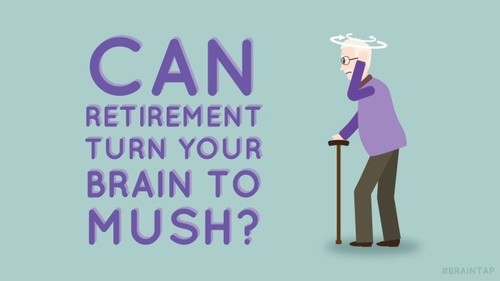

Humans are hardwired for purpose. Whether it’s found through education, a job or contributing to the well-being of family and friends, the need to feel like a productive, essential member of a community is a natural part of life. For many, this sense of fulfillment and belonging is shaped by a career—often to the point that work becomes inextricably tied to a person’s identity and sense of self-worth. But what happens when we retire?
Research shows a connection between the early stages of retirement and cognitive decline, and numerous studies indicate that retirement can exacerbate a slew of mental health challenges, including anxiety and depression. However, creative hobbies and other stimulating activities can accomplish the opposite effect, reducing risk of dementia as they help keep the mind sharp. Maintaining strong personal and social connections makes a difference, too.
To help those on the brink of this daunting shift, Forbes Health explored what tends to happen to a person’s cognitive and mental health in early retirement—and how retirees might avoid the pitfalls that often accompany this transition. Yes, it’s possible to grasp that elusive triad of fulfillment, happiness and contentment after a career ends and to stave off mental decline—it just takes some preparation, commitment and perhaps a fresh perspective.
Use It or Lose It: Mental Acuity After Retirement
It’s not uncommon for new retirees to feel suddenly adrift. Without the grounding structure and social bonds of work, retirement can be a jarring season of life. In fact, according to a June 2022 Forbes Health survey of more than 1,000 recent retirees conducted by OnePoll, 32% of respondents said they wished they’d kept working longer in their careers.
Another 32% admitted they didn’t feel well prepared for the day-to-day realities of retirement.
After walking away from the built-in stimulation of work (as well as the financial stability that comes with a steady job), new retirees run the risk of expedited cognitive decline. A 2017 study that tracked several essential cognitive functions of nearly 3,500 participants before and after retirement found “all domains of cognition declined over time.” What’s more, verbal memory specifically declined 38% faster after retirement than before retirement.
The brain is a “use it or lose it” kind of organ, according to Patricia Heyn, founding director of the Center for Optimal Aging at Marymount University and Forbes Health Advisory Board member. Without a job or career to focus on, and without a daily routine or scheduled events, it can be all too easy to let cognitive prowess wither. “Post-retirement is a very important stage of life,” says Heyn, adding that spending later years more meaningfully hinges on good habits built in early retirement. “To live those 30 years [after retirement] with joy and dignity, it starts with a healthy transition after our careers,” she says.
And though retirement might feel eons away, it could be closer than you think. In 2021 the average retirement age was 62, according to Gallup’s annual economy and personal finance survey. Meanwhile, Pew Research reports 50.3% of U.S. adults aged 55 and older were out of the labor force due to retirement by the end of the third quarter of 2021.
Average life expectancy in the U.S. is close to 80 years, which leaves plenty of time for most people to establish new routines, habits and rhythms after the close of their careers. Thus, it’s essential to keep an open mind and try new things after retirement, according to Linda Keilman, a gerontological nurse, associate professor and Forbes Health Advisory
Board member. “Being flexible and willing to try new activities or adventures presents a sense of wonder in seeing or doing things not tried before,” she says. Any number of hobbies or activities can help keep your mind sharp, she adds.
The important thing is to keep trying new things until you find something that makes you happy—and when that passion fades, move on to a new hobby.
Of course, activities are just one part of sustaining mental acuity. Research reveals that in addition to participating in engaging activities, certain lifestyle changes or adaptations can support cognitive health as we age as well, such as prioritizing sleep, relationships and exercise while limiting alcohol and smoking.
Fortunately, data reveals recent retirees seem to be doing a good job of keeping at it, as 80% of survey respondents say they’re taking active steps to maintain their cognitive health. But risks remain when these priorities fall by the wayside.
Retirement and the Risk of Cognitive Decline
The average person’s mental acuity—sharpness or ability to perceive—tends to peak around age 30, according to University of California San Francisco’s Memory and Aging Center. From that point forward, most people experience a subtle decline with age, often marked by difficulty with memory, multitasking and overall motor skills. Early retirement can accelerate this downward trajectory—especially for those who found deep meaning in their careers, according to Amanda Smith, M.D., a professor of psychiatry and behavioral neurosciences at the University of South Florida Morsani College of
Medicine and Forbes Health Advisory Board member.
“In my experience, the people who define themselves by their jobs and have few interests outside of work often struggle [in retirement] more than others, so it’s crucial for people to find other meaningful ways to feel important,” says Dr. Smith.
Retirees who fail to find a healthy post-career routine may notice some mental faculties slipping, though not every “senior moment” is cause for alarm. For those concerned about monitoring symptoms or possible signs of dementia or
Alzheimer’s disease, keep an eye on the following factors:
Getting lost in familiar places
Repetitive questioning
Odd or inappropriate behaviors
Forgetfulness of recent events
Repeated falls or loss of balance
Personality changes
Decline in planning and organization abilities
Changes in diet and eating habits
Changes in hygiene
Increased apathy
Changes in language abilities, including comprehension
Meanwhile, it’s possible to maintain some control over how quickly cognitive health shifts. For instance, research shows at least half of Alzheimer’s cases can be attributed to “modifiable” risk factors, such as:
Type 2 diabetes
High blood pressure
Midlife obesity
Smoking
Little or no mental activity
Little or no physical exercise
Of course, staying active, connected and in hot pursuit of fulfillment are within a person’s control, too. But some factors, such as geography and culture, might be harder for some retirees to overcome.
Going It Alone: A Uniquely American Problem
In many parts of the world, it’s common for older people to live in close proximity to—and often under the same roof with—family members and close relatives. In fact, Pew research suggests that living with an extended circle of relatives is the most common type of household arrangement for older people worldwide.
Senior living looks quite different in the U.S. Another Pew study reports that older U.S. adults are far more likely to live alone or with only a spouse or partner than extended family. What’s more, older people are more likely to live alone in the U.S. than anywhere else in the world.
For instance, 50% of older adults in the Asia-Pacific region live in an extended family household while only 6% of older adults in the U.S. claim the same arrangement. Meanwhile, 27% of U.S. adults age 60 and over live alone, according to Pew’s research.
This data highlights that while older U.S. adults may have plenty of independence, such living arrangements leave many without the safety net of having loved ones close by as they age. It also presents potential problems of isolation and loneliness, which are linked to cognitive decline, Alzheimer’s and a slew of other health problems.
Practical Ways to Stay Sharp After Retirement
Though it may be challenging—and even frightening—to consider the possibility of cognitive deterioration after retirement, there are ways to prepare and help prevent swift declines.
Talk to Someone
Sometimes even small conversations can make a big difference. “Often people struggle in silence,” says Dr. Smith. “If people are hesitant to share their feelings with loved ones or they don’t have anyone they’re close with, speaking to a therapist can be very helpful.” In fact, cognitive behavioral therapy can be particularly effective for people who may be in need of guidance but feel uncomfortable speaking with friends or family, she adds, as it can help someone rethink the way they look at themselves.
Regardless of who you speak with or what you chat about, the important thing is to connect on a personal, emotional level, says Heyn. Conversations can forge meaningful connectivity while simultaneously giving the brain a healthy workout, she explains. Research shows that even “small talk” offers a multitude of brain-enriching benefits. Chats have the power to boost the production of endorphins and dopamine, which can fuel joy and peace of mind.
By
Robby Brumberg , Alena Hall Editor
